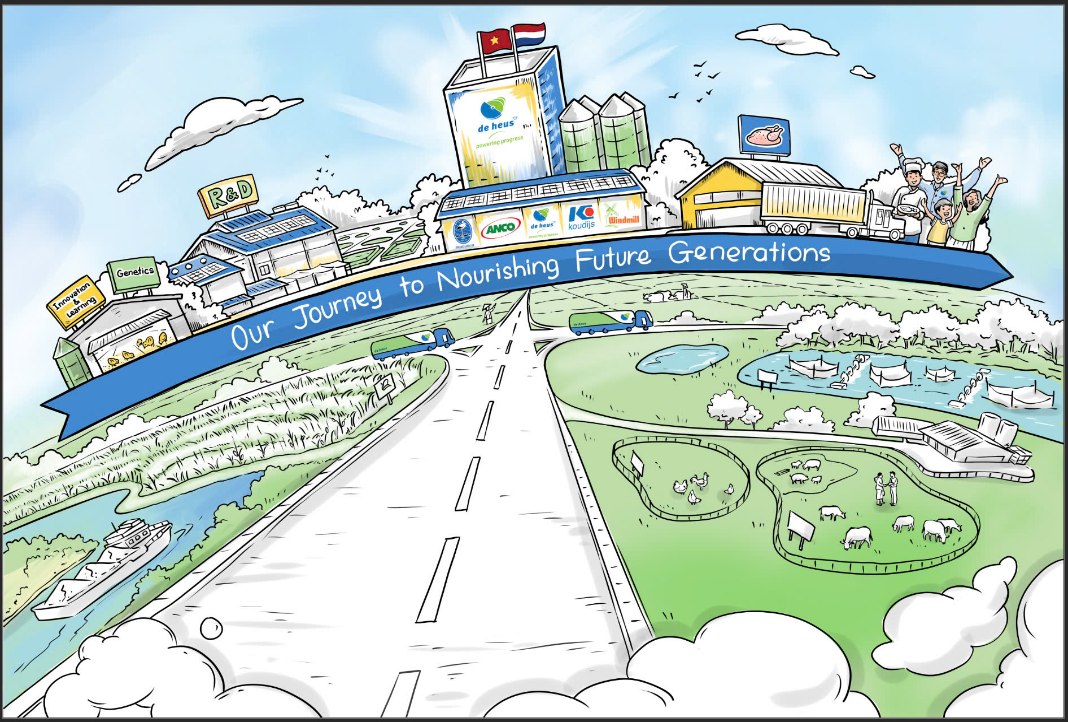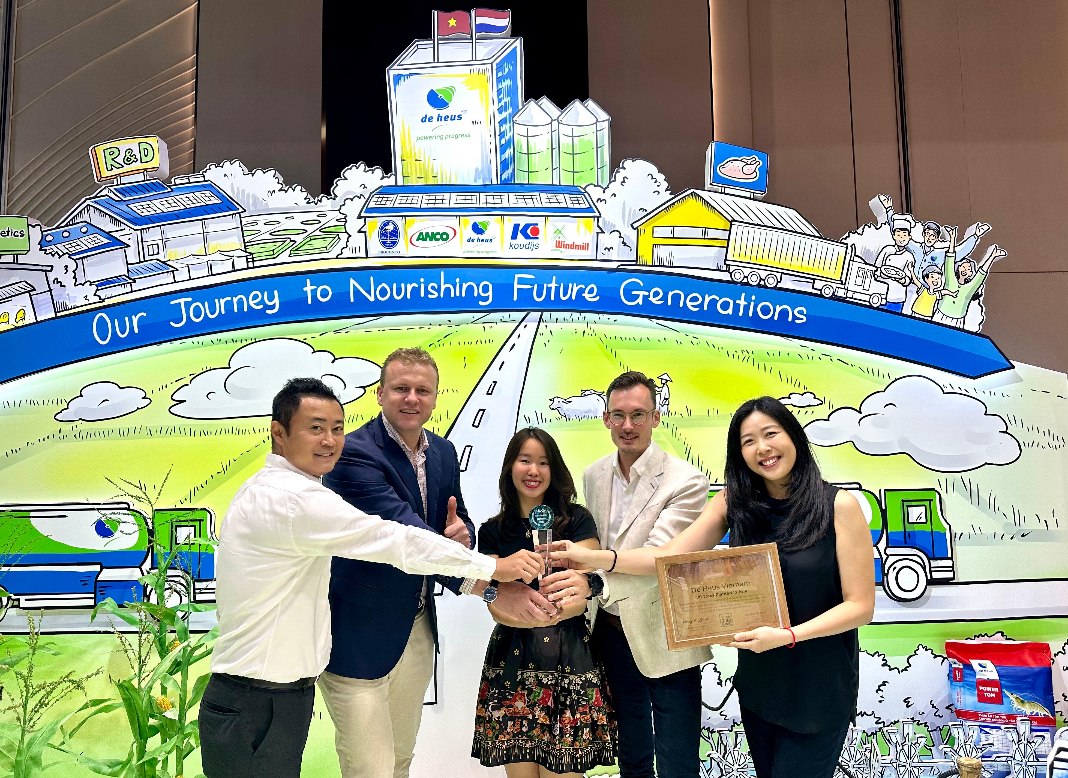Since its entry into Vietnam in 2008, the leading animal nutrition producer De Heus has been at the forefront of driving sustainability through innovative practices such as reducing greenhouse gas emissions, investing in renewable energy, and promoting circularity. By integrating sustainability criteria into its daily operations, De Heus continues to drive progress toward a more sustainable future for the animal nutrition industry in Vietnam.
Efforts to mitigate environmental impacts
With the utmost care for the environment, De Heus Vietnam has implemented various initiatives to reduce its environmental footprints in the feed production and food supply chains.
Among those is the ARC strategy (Avoid, Reduce, and Collaborate to compensate). As for the Avoidance pillar of their strategy, the firm looks for new ways to increase efficiency in the primary processes. Innovative examples include using residual heat from aqua feed production for heating and power generation, and the use of fewer conveyor belts driven by smaller, more energy-efficient motors.
The Reduction pillar focuses on investing in alternative energy sources, with plans to power 30 facilities, including factories, farms, and hatcheries, through solar energy, aiming for a total capacity of 20 MWp. It is expected to generate over 28 million kWh of clean energy and cut carbon emissions by more than 22,500 tons annually.
In addition, De Heus has introduced rice husk-fired boilers and aims to switch to electric forklifts by 2025. For emissions that cannot be avoided, the company compensates by assisting customers in reducing their emissions, sourcing sustainable raw materials, and investing in external renewable energy sources.
As for innovation to reduce plastic packaging waste, De Heus minimizes packaging waste by implementing bulk delivery and silo solutions, which currently account for 25% of their feed volume. They have also organized programs to recollect and upcycle packaging into office furniture and marketing materials and are exploring other reusing and recycling initiatives.
Innovation in sustainable agricultural practices
Along with various initiatives to mitigate its environmental footprints, De Heus has also paid attention to applying sustainable agricultural practices.
The company has developed an innovative farming model, called Mangrove Shrimp RAS Farming, to promote climate-resilient and responsible shrimp farming while addressing deforestation by fostering the application of the recirculating aquaculture system in the Mekong Delta.
In this system, water intake from natural reservoirs is circulated through bio-treatment ponds, rearing ponds, mollusk and plant treatments, and finally through the mangrove forest before returning to the system. The model leverages ecosystem services provided by mangroves and aquatic species regarding filtration, carbon sequestration, and water reuse. This model is expected to increase shrimp farmers’ productivity by 20-25% through more efficient resource usage, and also facilitates farmers’ transition to climate-resilient practices, mitigating risks associated with climate change such as heat waves, disease outbreaks, and pollution. Furthermore, this model actively encourages reforestation through mangrove rehabilitation efforts.

Sustainability cultural integration
At De Heus, sustainable practices are deeply embedded in company policies and everyday operations, with safety, health, and well-being at the core of the sustainability culture.
Safety is not merely a priority but is regarded as a critical precondition for creating an empowering and thriving workplace. All employees at De Heus receive comprehensive safety training, and each location is equipped with life-saving equipment, such as Automated External Defibrillators (AEDs).
The commitment to safety is reinforced through active involvement from the Board of Directors (BOD), who play a key role in the Safety Board. Monthly Safety Board meetings provide a platform to review safety reports, address near-miss incidents, and make timely decisions on safety improvements. The internal campaign, “Be Safe Every Minute, Be Happy Every Day,” promotes a safety-focused mindset through monthly quizzes, a safety idea contest, and localized coaching sessions, engaging all 3,200 employees.
Encouraging physical health is also a priority, as shown by nationwide sports events organized since 2021. Over 2,000 participants have joined in activities such as running, swimming, cycling, and football. Inspired by the first edition of the De Heus Marathon, many employees now participate in marathons and ultra-marathons across the country.
Additionally, consultation sessions with doctors and specialists cover topics on physical and mental health, as well as personal financial management, offering employees a safe space to address any concerns.
In an effort to create a more inclusive and equitable workplace, De Heus recognizes the agriculture sector’s traditionally male-dominated nature and is committed to fostering diversity. The organization consists of six nationalities, and women make up 30% of the management team. This commitment to inclusion ensures that all employees, regardless of gender, nationality, or background, are treated equally and feel like part of the family.
Sustainability at De Heus Vietnam is a shared responsibility and journey embraced by all. Every one of the 3,200 employees is considered a member of the sustainability team, contributing ideas to enhance energy efficiency and participating in environmental initiatives, such as beach clean-ups. In the past year, employees and their families have jointly planted over 5,000 trees in Phuoc Buu, Cuc Phuong, and Bidoup national parks, an effort that reflects a long-term commitment to reforestation and waste management efforts in Vietnam.
Community contributions
Throughout its presence in Vietnam, De Heus has consistently demonstrated its commitment to corporate social responsibility, not only through its business operations but also through a wide range of community-focused initiatives.
Notably, De Heus is committed to supporting people of Vinh Long through a 10-year partnership with the Eye Care Foundation (ECF). In that period of time, De Heus has sponsored an eye examination and treatment ward at the Vinh Long Ophthalmology Hospital, providing eye screenings, free spectacles, and cataract operations for school children and the elderly. This initiative, in collaboration with ECF, local government, and healthcare institutions, also aims to improve eye care infrastructure, train medical professionals, and raise awareness about the importance of eye health and its connection to conditions like obesity and diabetes.
Along with the care for needy people, De Heus has also paid attention to nurturing the young generations and empowering farmers.
Since 2021, the firm has implemented SYOF, a scholarship and education support program designed for talented students aspiring to build a professional career in the agriculture sector. Within this program, a special English-language curriculum is carried out, with the participation of guest lecturers and De Heus’ senior specialists, to inspire talented students and provide a solid foundation to prepare them for their future careers.
Regarding efforts to empower farmers, over the past 15 years, De Heus trains 10,000-15,000 farmers annually on farm management, disease prevention, and biosecurity control among others. To expand the reach of these programs, De Heus is exploring interactive e-learning platforms, particularly for key sustainability topics like responsible antibiotic use, waste management, and GHG reduction. By incorporating gamification, the aim is to make these complex issues more engaging and accessible, motivating both farmers and students to adopt more resilient and sustainable farming practices.
With these efforts, De Heus has been recognized as Green Business of the Year in the Sustainability Champion 2024 by the Dutch Business Association in Vietnam.
Looking to the future, De Heus Vietnam remains committed to further advancing its sustainability efforts, continually innovating to meet the challenges of a rapidly evolving world. By deepening its focus on sustainable agriculture and community empowerment, the company is poised to play an even more pivotal role in shaping a greener, more resilient Vietnam.









